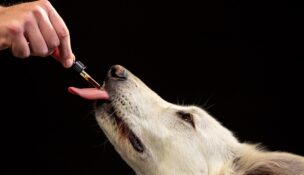Aging Gracefully: Senior Pets Benefit From Proper Diet, Mental Stimulation
Glenn Polyn//November 1, 2023//
Aging Gracefully: Senior Pets Benefit From Proper Diet, Mental Stimulation
Glenn Polyn //November 1, 2023//
Though all pets age, there is a great deal of variety across the lifespans of popular domesticated species. The point at which a companion animal becomes “aged” varies across species as well as on an animal’s physical characteristics — for example, a dog’s size. A larger 6-year-old dog might be more aged than a small 6-year-old dog.
With cats, they enter their senior stage by the time they reach 7 to 10 years of age, perhaps 12 years old at the latest. Meanwhile, hamsters have lifespans that range from one year to three years, depending on the breed. Toward the other end of the spectrum, macaws can reach 50 years of age while certain reptilian species, including turtles and tortoises, can live up to 40 to 60 years, with proper care.
“A grey muzzle might be a classic giveaway of a dog’s advancing years, but we don’t tend to see the same changes in rabbits and guinea pigs,” said Claire Hamblion, marketing director at Supreme Petfoods. “There’s no hard and fast rule as to when small pets become senior. When it comes to rabbits, larger breeds tend to have a shorter life expectancy than smaller breeds, and pure breeds have reduced longevity compared to a mixed breed. This means for example, that a Netherland Dwarf rabbit might be expected to live to 12 or 13 years and be considered senior at around the age of 8, while a large breed such as the French lop, or Flemish giant would have an expected lifespan closer to 6 or 7 years and be considered senior at around 4 years of age.
“For guinea pigs, a lifespan of 5 to 7 years is average,” Hamblion added. “Just as in rabbits, many factors, including genetics, will determine the age at which guinea pigs are considered senior, but it is usually somewhere between 3 and 5 years of age.”
A pet’s senior life stage brings with it many questions for pet parents. What can they do to increase their elderly companions’ quality of life? What changes can they expect to see in their furry, feathered or scaled friends as they grow older?
It’s not easy for the untrained eye to spot symptoms of aging, so it’s important that pets receive yearly physicals with their veterinarians. However, according to industry experts, dogs typically enter their senior stage at approximately 7 years of age, when the canine’s glucose metabolism in the brain begins to change. This can affect memory, learning, awareness or decision making. The normal energy source that those brain cells would use is glucose, and so they become less effective at metabolizing glucose, which means less effective at providing energy for these brain cells. Signs of such changes could include decreased activity and playfulness, more difficulty learning and disinterest in interacting with people or other pets.
It’s generally understood that energy levels, mobility, appetites, muscle mass and weight are all likely to change as pets enter their golden years. In addition, the effects of aging can include arthritis in small animals and issues related to kidney disease and high cholesterol in birds.
“Small pets that are overweight are at a much higher risk of arthritis and it is important that owners are aware of this,” noted Hamblion of Supreme Petfoods. “As pets get older, their activity levels tend to decrease while their metabolism slows down, a surefire recipe for weight gain. When it comes to the nugget portion of the diet, paying careful attention to portion control is key.”
One of the keys to keeping pets healthy as they age is to begin taking their health seriously long before aging begins. Species-specific and nutritionally balanced diets with plenty of physical and mental stimulation will go a long way in allowing companion pets to age gracefully.
“Advances in small pet nutrition and husbandry as well as veterinary care and knowledge mean that small pets are living longer, happier lives,” explained Hamblion. “As lifespans increase, so do the number of older pets, and diets tailored for senior years are becoming a firm fixture in the small pet category.”
High quality species-specific nutrition is important throughout the life of small pets, and whether young, adult or senior, the basics stay the same – unlimited hay, aiming for a body sized amount each day, and a carefully measured portion of species-specific nuggets every morning and evening. Science Selective Four+ Rabbit Food is formulated to meet the specific requirements of mature rabbits, aged four years and over. The nuggets have a reduced protein and energy content to help maintain a healthy weight, together with a calcium to phosphorus ratio optimized for joint support. Like the rest of the Science Selective lineup, the nuggets are fully extruded to make the nutrients easier to digest.
When it comes to guinea pigs, obesity and vitamin C deficiency (or excess) can both play a role in the development of arthritis and is one of several reasons why good quality food, formulated specifically for guinea pigs should be recommended both in the senior years, and throughout life.
Vitamin C is relatively unstable and tends to degrade over time, especially if it is exposed to light, heat and moisture. Therefore, Hamblion says it is important that owners follow the manufacturer’s storage and “use by” instructions. All Supreme guinea pig diets, including Science Selective Adult Guinea Pig Food, contain vitamin C in a stabilized form to prevent it from degrading.
All animals need mental stimulation. Rabbits and guinea pigs with mobility issues are also likely to benefit from adjustments to their environment and husbandry. Owing to a reduced ability to groom, older pets are at increased risk of fly strike and owners need to be vigilant about hygiene, cleaning hutches and runs regularly as well as checking pets for fly eggs, maggots, or other signs of this distressing condition at least twice a day. Providing plenty of soft bedding can make the life of a senior pet more comfortable.
As for other animal categories, Birds need vitamin A, and without vitamin A they get changes in their kidneys and gout. Even reptiles need calcium in their diet, and a lack of calcium can result in them suffering from metabolic bone disease where their bones start to break down.
Specifically made for senior parrots, Lafeber’s Senior Bird Nutri-Berries parrot food is formulated with plums, dates, cranberries, milk thistle, dandelion, ginger, chondroitin and glucosamine to address the many ailments that older birds can experience, from inflammation to high blood pressure With 61 percent of the Senior Bird Nutri-Berries comprised of pellets, 26 percent as whole grains and 13 percent fruits and herbs, the reduced caloric needs of senior birds are met while also providing the nutrition and foraging fun that is important to its mention well-being.
Research has shown that pelleted diets for reptiles provide balanced nutrition. Such brands as Mazuri, Zoo Med, Zilla and Fluker’s produce pelleted diets for reptiles. In addition, Repashy Specialty Pet Products makes gel food premixes and meal replacement powders for many reptilian species. Most reptile diet manufacturers, including Zoo Med, Zilla, Fluker’s and Repashy, also offer calcium supplements that are essential to the health of many reptile pets as they age.
While it’s ideal to have a dog or cat on a premium diet early in life, the right nutrition can still benefit aging animals. Annamaet’s Re-Juvenate is a senior-specific, grain-free formula that uses wild-caught silver carp as a protein source. Silver carp feed on algae, which is high in Omega-3 fatty acids and plankton. The recipe also includes turmeric, which is one of the most potent and natural anti-inflammatories available, and coconut oil, a rich source of medium chain triglycerides (MCTs) that are known to help improve mental sharpness by increasing brain energy metabolism. Re-Juvenate with algae, L-Carnitine and higher levels of DHA is designed specifically to enable older pets to live longer, healthier lives.
Diamond Naturals is another pet brand that has designed a pet food specifically for elderly canines. Its Senior Dog Chicken, Egg & Oatmeal Formula is specifically formulated for aging dogs, with carefully determined protein and fat levels to support a healthy body condition. This formula includes glucosamine and chondroitin for joint support, assisting with mobility and comfort, as well as probiotics and fiber, which aid digestion. Packed with superfoods, selenium and vitamin E, this formula helps to support the immune system and a healthy lifestyle.
“Our Diamond Naturals Senior Dog Chicken, Egg & Oatmeal Formula has lower protein, fat and calorie content, which is beneficial for senior dogs that aren’t as active as they used to be.” Said Mark Brinkmann, vice president of operations at Diamond Naturals. “This formula contains guaranteed levels of taurine to promote healthy heart function, as well as L-Carnitine, which helps support normal metabolism and blood sugar levels.”
When it comes to an older dog’s dental care, NPIC, the maker of Get Naked and N-Bone pet treats, offers its innovative N-Bone Senior Dental Rings that is the only dental treat designed specifically for senior dogs. The dental treat come in a unique ring shape and is fortified with such functional ingredients as DHA, glucosamine and chondroitin to support the healthy brain and joint during a dog’s golden years. Each ring is handcrafted with care in the U.S.A. and contains no wheat, corn or soy. Available in a chicken flavor, the treat features a pliable texture that is easy to chew and is gentle on a dog’s aging teeth.
To address the special needs of elderly felines, Tiki Cat offers a range of wet food diets that offer customized nutrition for cats 11 years of age and older. The brand’s Tiki Cat Silver line comes in three varieties, with each offering increased amounts of high-quality, easily digestible protein and fat to help maintain weight and muscle mass. Pumpkin has been added to provide gentle fiber that aids digestion, helping cats process the food more efficiently.
As a cat ages, its immune system declines, and the feline’s diet can play a role in slowing the process. Omega fatty acids as well as antioxidant vitamins A and E have been added to Tiki Cat Silver to support strong immune systems. Omega fatty acids, coconut and tuna oil also promote joint health for better mobility.
Tiki Cat refers to Feline Nutrition Foundation, which reports that restricting the phosphate content of the diet can help protect the kidneys from further damage in cats with chronic renal failure. With that in mind, Tiki Cat Silver was formulated to be very low in phosphorus, a mineral that tends to build up in the blood of cats suffering from kidney disease.
Many pet store owners understand the stress that goes into caring for an elderly pet; therefore, it’s not unusual for retailers to take on the responsibility of offering guidance to pet parents, and they make it a point to stay informed on up-to-date guidelines regarding senior pet care. It’s vital for retailers to know the basic science of how an animal works, including the pH balance in their stomachs, how short their digestive tracts are, how important it is for them to absorb nutrients quickly. In addition, a steady flow of communication between pet professionals, specifically veterinarians and retailers, is equally important.
Of course, it’s important for retailers to speak with potential pet parents about the commitment they’re making by adding a pet to their family. Once those companion animals reach an elderly age, some may require specialized care and support. However, it’s never too early to begin laying the foundation for a companion animal’s long and healthy life.



















